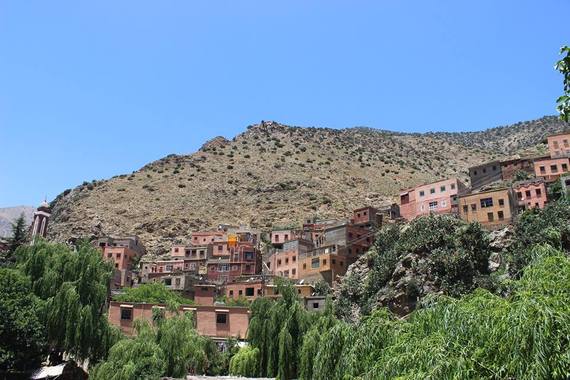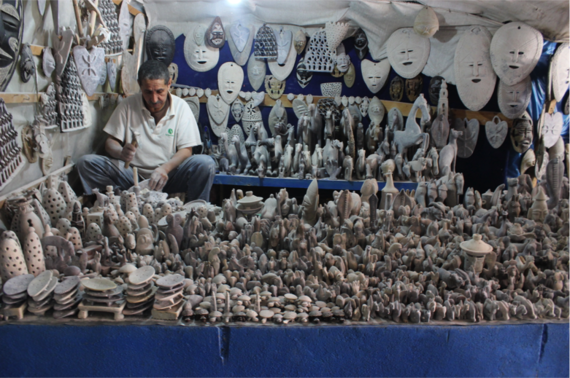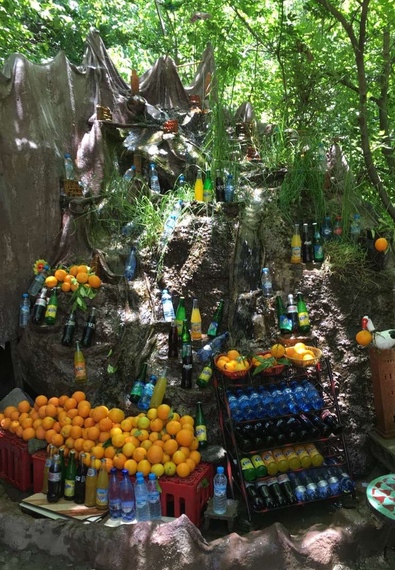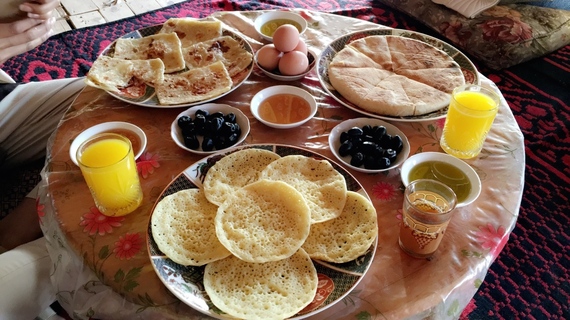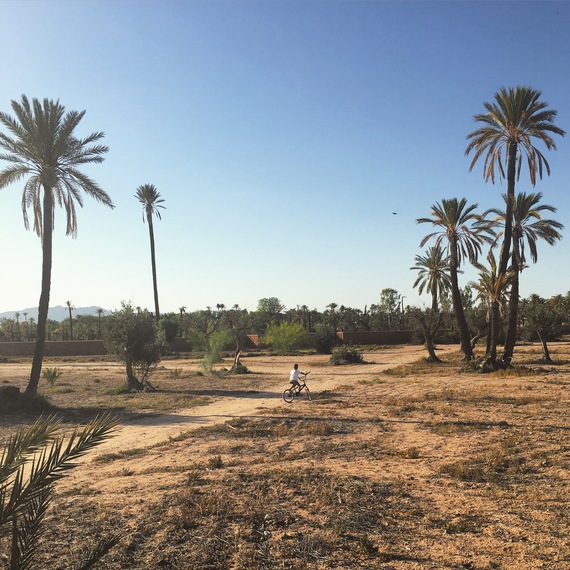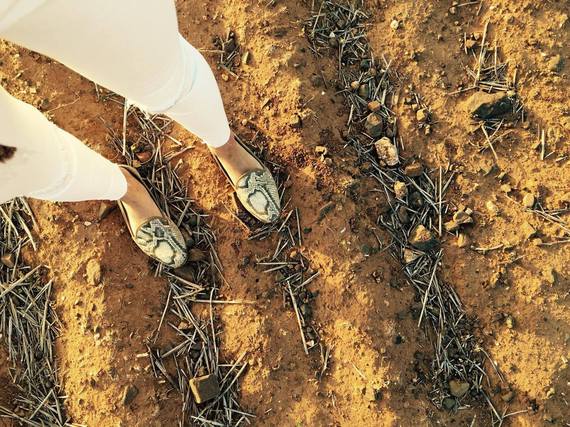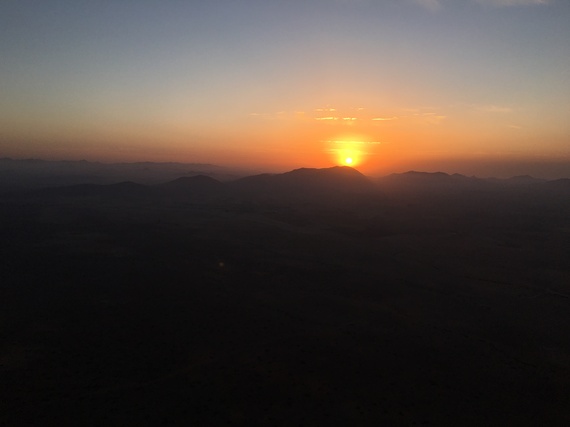What a few days in Marrakech taught me about happiness...
Imagine waking up and hearing nature's breeze, feeling the warm sun comfort your skin, seeing shades of green so deep that make you believe in the innovation that is Earth. Maybe you live in a fast-paced city or a quiet rural area, but the first thing you do is take a minute to yourself. No email, no Instagram post, no Snapchat is worthy of that moment when you awake. You have time to eat breakfast with your family. You meditate, you read (an actual newspaper or book). You walk your dog. You know your neighbors. Perhaps you even look forward to Mondays, and you work because you enjoy it. You spend quality time with your friends and family, and pursue your passions with a vivacious spirit. Your possessions are few, because your happiness lies in interaction and love. You invest in experiences.
There are two distinct ways through which people experience happiness: short-lived happiness (excitement, euphoria, intensity) and long-lived happiness (contentment, calmness, stability). Society tends to settle for happiness that is short term and thus possession-based. The media, alcohol, and drugs, are all examples of coping mechanisms by which a capitalist system thrives. Long-lived happiness, however, is internal. It's purpose-filled. Sure, it's a much more difficult process requiring dedication and hard work, but the feeling you receive cannot be associated with a price as it is truly invaluable. It's a process by which struggle and adversity result in self-awareness and self-improvement. There is no right or wrong, but the evolution of how we strive for satisfaction does parallel with the progression of consumerism.
I recently travelled to Marrakech, Morocco, and witnessed life that exhibited the authentic happiness so much of us aim for. It was through my interactions that I experienced a sense of fulfilment that was a true luxury. I remember my conversations with the Moroccans I met. I remember feeling the cold, rushing water of the waterfalls in between my toes that sat upon smooth, warm stones you could barely see through the water. I remember spending time with my family as we immersed ourselves in the beautiful culture and conversed about its allure. I don't have to look up messages or pictures on my phone to prove any of this -- only a mental image that is stored in my mind's hard drive (fun fact: there's no limit to its storage). This was a trip about wanderlust, adventure, and celebration.
I observed life that was euphoric. People took pride in their work and their country, not themselves. As I trekked the Atlas Mountains and introduced myself to locals of the Ourika Valley, I experienced an interaction that was unique. I approached a man carving a lion from what they refer to as "magic stone," which changes colour underwater. He handed me the lion, and I realized it was so much more than a souvenir. He was giving me part of himself: his city, his land. It was never about the money. In fact, I didn't feel like I was paying for the lion, but rather rewarding the gentleman for his work (and was extremely happy to do so).
As I continued to seek adventure in the Ourika Valley, I passed by what the locals call an "ecological fridge." I found it fascinating how food and drink items were stored in a sustainable, efficient manner. I then realized we have more than we need -- well, everyone knows this. But it's more than just the quantity of what we have, it's the fact we have what we do. Earth gives us all the resources we need to live, and yet our actions have continued to kill what is available. Why not utilize the resources in a way that can be sustained for generations to come? How have we neglected this?
Throughout my days in Marrakech, my family and I visited villages that fed us fresh breakfast composed of food grown by the men and women of their respective villages. Whether it was olive oil straight from the seed, or bread from the wheat fields, you could taste the "home-ness" of the food. No fancy restaurant could compare to the traditional meal we had made by the hands of local Moroccans.
As we were exploring the Palmeraie one morning, I noticed a little boy riding his bicycle. He seemed free. He had the autonomy to roam, to explore, to fall down and get back up. I compared it to my childhood: my dad would drive me to a park where I could bike safely, and then play on the monkey bars until my hands couldn't take it anymore. This little boy showed me we don't need playgrounds to play. In fact, we don't need anything but ourselves. Humans have always been at the forefront of innovation -- not our products.
So why are we always racing to get the next best thing? Why do we wait hours in line to buy a product that is only marginally different from the one we currently have? What is the motivation for us to conspicuously consume? I'd say it's short-term happiness. This intense excitement diminishes fast and prepares us for the next new thing. We experience this every Black Friday, every phone launch, every sale.
Richard Robbins stated in Global Problems and the Culture of Capitalism, "our consumption of goods obviously is a function of our culture." Through producing and selling items, capitalism is able to function. The more that is produced/purchased, the more progress and prosperity is generated (Robbins 1999). However, we often disregard the consequences of production and consumption, which require the use of natural resources and the creation of factories. These factories not only produce toxic waste, but also goods that contribute to pollutants. For example, the factories that make cars and trucks emit pollutants endlessly, and these vehicles do the same during their operation.
Our consumption, however, has only increased for the last century. This is attributable to how consumption plays a major role in our lives, and has thereby assimilated into the culture by which we live. It also has a large influence in the economic operations of our society. A drop in demand for products could result in an economic recession in addition to high unemployment rates. Furthermore, as consumption increases, resources expand to meet these growing demands. That is how the rich get richer, and the poor get poorer.
The UN Development Program points out that 86 percent of the world's resources are consumed by the world's wealthiest 20 percent. Thus, the resulting 80 percent only get access to 14 percent of the resources. The interesting idea behind this statistic is that wealth and happiness are not necessarily equivalent. How can we stop the consumerism that is striving for happiness -- but will perhaps never reach it?
There is no end to greed they say, but I believe we can limit it. Sometimes taking a few steps back is the best way to move forward. When we lose something, we retrace our steps. If we've lost what truly makes us happy, why not do the same? Let's take a step back.
